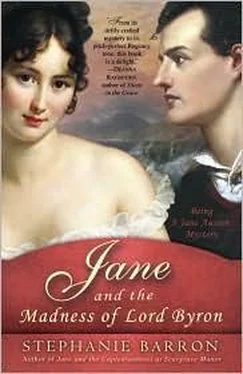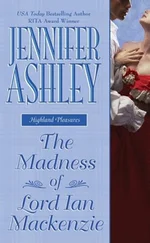“Then let us hope Lady Oxford exerts her considerable energies in sailing past Gibraltar,” I replied, “and that Lord Byron is left to enslave another lady with his verse and his caprice.” If I felt a slight wistfulness at failing to bid the poet adieu , I ruthlessly suppressed it. I did not approve Lord Byron, I should never judge his character as worthy of respect—but it is something, indeed, to have won the esteem of such a writer. I shall not judge myself too harshly for exulting in his privileged knowledge—or his flattering regard.
“If Lady Oxford does not know how to repay Jane’s exertions,” my brother interjected, “I certainly do . You came here for the restorative powers of Brighton; and thus far, have enjoyed none of them. Tomorrow you shall bathe in the sea, with the aid of a dipper and a machine—”
I confess I squeaked at this, from both pleasure and dread.
“—but today, you will spend the whole morning at Madame La Fanchette’s, in purchasing a modish gown in any colour but black. There remains a quantity of winnings that must be spent.”
Lady Swithin clapped her hands, and I jumped up to hug my brother; he truly is such an excellent Henry.
SILK THE COLOUR OF WINE, LORD HAROLD’S GHOST HAD urged; an opinion seconded by Mr. Forth, the redoubtable Master of Brighton, who had gone so far as to name the wine claret . Madame La Fanchette possessed no less than three bolts of a suitable shade—one a sarcenet, one a French twill, and the last a silk so gloriously rich I might fancy myself a figure in the Regent’s Chinese gallery, as precious an objet d’art as the porcelains he collected. My practical soul counseled the selection of French twill—as serviceable as it was fashionable; I reluctantly weighed the claims of stout sarcenet; but another voice—neither Lord Harold’s nor Mr. Forth’s—whispered me nay .
Let it be the taffeta, my dearest Jane .
And I caught a snatch of laughter tinkling as bells, remote and beguiling as birdsong.
Eliza . She was with me still, and I was returned on the instant to Sloane Street, her soul flying away from me without a backwards look. My eyes pricked at unexpected tears, despite the blandishments of Madame La Fanchette, the furls of cloth sliding between my gloved fingers, the dulcet chatter of Lady Swithin as she turned the plates of a fashion magazine. My breath drew in on a sob, quickly stifled.
Forgive , the butterfly shade murmured. You know what Byron is. You felt it, I am sure. The response, so involuntary, of every nerve. A woman might sell her soul for such an instant of glory .
Of course I had felt it.
Regret. Regret .
Forgive .
Of course you are forgiven, Eliza—and never forgotten. Never.
“Jane?” Mona said gently. “Are you unwell?”
I blinked back my tears, and fumbled in my reticule for one of Manon’s black-edged kerchiefs. It was Mona, however, who handed me her own—embroidered with the flourishing script of entwined initials, Wilborough and Swithin.
“In all this bustle of murder and accusation,” she said softly, “I had almost forgot you were mourning.”
I smiled at her. How extraordinary it was that I should find again this acquaintance of long ago, this connexion unlooked for to my roguish lord; how extraordinary that in Eliza’s passing, I should discover a friend .
“I believe,” I said firmly, “that I shall take the claret-coloured silk. A ball-gown with demi-train, in the very latest mode, Madame—and a headdress to match.”
Eliza should have countenanced no less.
It was as we were leaving Madame La Fanchette’s some three hours later—I, smug in the knowledge of having ordered a becoming gown for evening wear, Mona in possession of a very fetching carriage dress that should become her dashing perch phaeton to perfection—that we espied Lady Caroline Lamb, bound for the New Road.
She held the reins of a showy pair whose coats exactly matched the tint of her own cropped curls; her landaulet was piled high with baggage. A diminutive tyger was mounted behind—no more than a child—in the chocolate and maroon livery the Lambs favoured. Her ladyship pulled up at the sight of us, and inclined her head; and Mona—when put to the test of acknowledging the reprobate, or offering the cut direct—deeply curtseyed.
“Bound for London, Lady Caroline?”
“Naturally—for Byron has already gone, you know.” The Sprite’s mobile countenance—so often captured in dreaming or fury—was woebegone today. Byron had escaped her toils again; her pallor was extreme, her glance feverish, her eyes encircled with darkness. She had not slept from the moment the wild plan of impersonating the Regent’s page had overtaken her, I judged; and now that her god was freed, her costume thrown off, her drama run—she was cast off, by Regent and poet both. Poor Sprite! So like a child in her passions and tantrums, and a lost child now in her misery, lips trembling and fingers clutching at the reins. The smouldering fire of life was doused—Byron, in all his intensity and chaos, had fled. “There is nothing else in Brighton I should stay for,” she said petulantly. “I quite despise the sea, and this town is grown impossibly stuffy—all quizzes and dowds! Besides, my poor William will be wondering where I have got to.”
Poor William, I thought, should more likely be enjoying the first peaceful interlude he had known in nearly ten years of tempestuous marriage; but it should not do to say so aloud.
“I almost forgot!” Caro cried. “I have thought of the most cunning thing—only look at the buttons of my tyger’s livery! I mean to have all my servants sport the same!”
We approached the carriage at her ladyship’s behest, and leaned closer to study the boy’s buttons. Engraved on their face was the Latin inscription Ne crede Byron .
Do not believe Byron.
“The Regent’s silversmith engraved them for me,” Caro confided, “and is not the phrase apt?—For you cannot believe a word his lordship says. It is all poetry. George assured me, when I rescued him from that horrid gaol, that he meant to remain in England all the summer; and now I find he intends to sail to Sardinia, in pursuit of that tiresome Jane Harley. Byron, of course, insists it is to gather impressions for his verses—having done with The Giaour , he means now to embark upon a long narrative entitled The Corsair , and must therefore put to sea at once. I am sure it will be vastly exciting, but I dread the effort of persuading poor William to embark. I may be forced to abandon my home. Do you think,” she enquired dreamily, “that I should look well in the garb of a pirate? Or perhaps a pirate’s jade?”
Mona and I exchanged glances, then stepped back from the landaulet.
“Walk on,” Caro commanded her pair; and with a flick of her whip and a nod of her head, moved briskly up the New Road.
“Jane,” Mona said faintly, “I stand in need of a good, stout nuncheon; and then I must look into Donaldson’s. I have had enough of poetry. I require a dose of prose. I shall spend my remaining hours in Brighton established on the sopha, with a volume of Pride and Prejudice in my hands. Do you think it at all likely the authoress has commenced a third novel?”
“I had heard, ” I answered cautiously, “from sources I should judge unimpeachable, that such a work is undertaken—but is not yet launched upon the unsuspecting publick.”
“It does not, I trust, deal with piracy?”
“I believe the subject is Ordination.” I glanced at her with considerable apprehension, to learn how so fashionable a member of the ton should receive such a tedious topic.
Читать дальше












